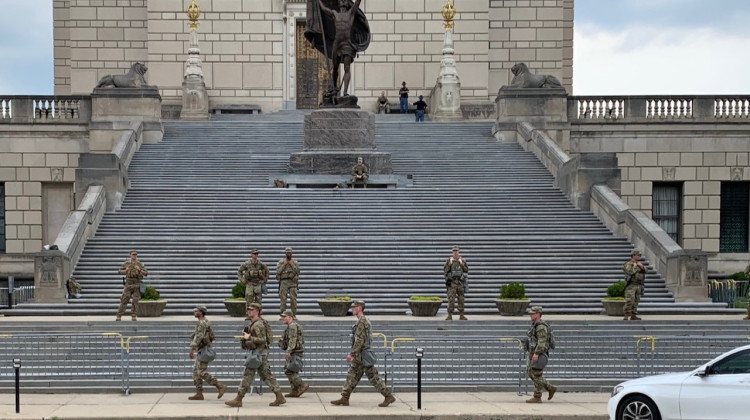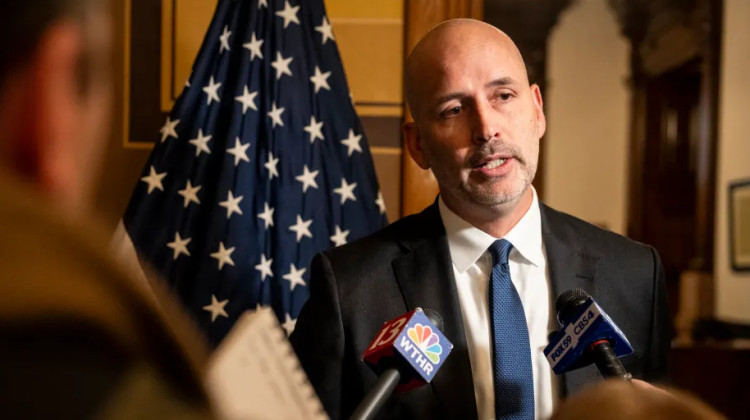Violent crime is on the rise in Indianapolis, with about 160 people killed so far this year.
While police and other public safety officials are calling for more intervention, one group is doing what it can behind the scenes.
The violence interrupters program is a new initiative that started this year to prevent incidents from escalating into violence. The violence interrupters are a small group that’s not affiliated with the police and stay out of the media spotlight to protect their identities and build trust with the community. Mayor Joe Hogsett included in his proposed 2022 budget that he wants to grow the program. As of Aug. 4, the group has interrupted nearly 430 conflicts.
WFYI’s criminal justice reporter Katrina Pross spoke with Executive Director of the Indy Public Safety Foundation Dane Nutty and the Director of the Office of Public Health and Safety Lauren Rodriguez to learn more about who the violence interrupters are and what they are doing in light of increased crime.
This interview has been edited for length and clarity.
Katrina Pross, WFYI: What are the violence interrupters and what do they do?
Dane Nutty, executive director of Indy Public Safety Foundation: So violence interrupters, they are contracted through the Indy Public Safety Foundation, and these are individuals that have a past experience with the criminal justice system, they're credible messengers that know how to navigate the community. They're from the community, know who the players are, and really are utilized to make sure that we are getting in touch with and connecting with people that make an act of violence, and oftentimes that is gun related.
Most notably, they respond to, you know, shooting scenes, places where violence may be occurring, and they stop the retaliatory cycle of violence. So they interrupt that cycle, right? And then ideally get started to build a relationship with these individuals that we can then through a team based approach get connected with additional resources.
Pross: When did that violence interrupters program begin and about how many violence interrupters are there?
Nutty: While the violence violence interrupters have been serving in various capacities in the city for several years, our program and kind of this formalized program started in the beginning of this year. So we're just seven months in at this point. We have six interrupters. And so those are based throughout the city and in various areas.
Pross: Could you talk a bit about how violence interrupters, how they you know, differ from police officers and how they fit into the overall public safety?
Nutty: The idea is to have complete separation, right? So these interrupters don't have any engagement with the police department. Oftentimes, they've even been in jail or prison or have had some criminal justice involvement in their past. So we keep that separate for a reason and part of the interruption model is that it's a community based strategy.
And with that, requires a lot of time and resources in order to build trust with people. And so we make sure that delineation is pretty clear that our interrupters do work with Lauren, and her team of resource coordinators, to make sure that we're hooking up folks and getting them into help with any kind of services they may need, whether it's employment, housing, food, you name it.
Lauren Rodriguez, director of the Office of Public Health and Safety: So typically, our team works very closely with Dane’s team. But our team is kind of like the connector almost to IMPD, they're more outwardly facing. So the idea behind Dane’s team is that, you know, we don't want them to be publicized out in the media, right, because it could put their lives into danger. And they already put their lives into danger on a daily basis for us.
And so they are able to work closely with our team to give our team some information that we may not have known. It's definitely been a learning experience. And I think we're working out the kinks on that piece. But I think that the relationship between both teams is really solid. And we have really good groups of people that are willing to curb violence in Indianapolis.
Pross: Indianapolis and cities across the country have been experiencing an increase in violent crime this year. Have the violence interrupters been responding to more calls, or how has this increase in violence affected their work?
Nutty: So we just started this program this year, right? So we don't really have any 2020 versus 2021, increase information. So really, they've just been hitting the ground running and responding to what they need.
What we are seeing is that based on the model, and other applicable cities, they're responding to about the same level of conflicts that we are seeing throughout the country. Again, part of that is not only us kind of building the program, and then learning and getting into their role. There's a huge portion of this that involves the community being aware and educated about this model, too. So I think we're in the middle of that process as well. And that's not to say like the outcomes and some of the impacts in numbers we've seen so far are pretty incredible. And these individuals willingly put themselves at high levels of risk on a day to day basis. And I think that alone, is something to be commended.
But then on top of that, to see the numbers and deliverables that they're achieving each month, really gives us hope for impact. And I'd be remiss if I didn't say we don't expect a huge marked increase within one year, right? This is a 20-, 30-year-old problem, or a decade's long problem. We're going to need at least two to three years to really solidly learn and get some footing to make sure that we're making an achievable impact.
Rodriguez: I also would say that I think that these are systemic issues that we're facing, right, they're bubbling to the surface. And nobody likes to hear it, but COVID did exacerbate these issues on a scale that probably no city was prepared to embark on. But I think that the city's dedication to these program initiatives has been able to save lives.
I know that we see these shootings and they're tragic and they're horrible, and nobody wants to have to hear about that. But I do believe that what we're doing has made a difference in that the numbers could have been worse. I'm very hopeful that the more dollars that we get into this program, the more wide scale we're able to do, and that we're making a bigger impact.
And we're creating something sustainable, right? This is not just about our generation of workers, right? We're trying to create something that will last generations to come. So that way, we can not only interrupt the violence that's happening right now, but prevent the cycles from occurring to create more shooters, all these shooters were children at once. And so we're tackling it at many, many levels. And at all angles.
Pross: What trends in crime have the city and the violence interrupters been seeing?
Nutty: I mean, I think it's pretty clear, we're seeing an increase in gun violence, right, and shootings. And so that's our main focus with this is getting in front of people that are committing those types of crimes. So that's where our kind of narrow focus is at. Certainly there are other types of violence, including very important things like domestic violence, and everything across the board is significant. But with an expanding and growing program, we're looking at the most kind of violent folks at this point.
Pross: What resources are available to members of the public, either if they've been affected by a crime or have experienced one, just during the visit this increased time of violence?
Nutty: In terms of resources there's a huge amount of resources and programs that are available. It's just helping people get connected to those oftentimes, you know, somebody that's working in one of those spaces and social services think, ‘Well, we've got all these great programs, why aren't people coming to us, right?’ And the beauty of what both the interrupters and I know Lauren, human resource managers do is they meet people where they're at, and they do everything possible, whether it's call text, email, FaceTime, Snapchat, whatever communication method, in person, they'll just show up at their house. And I think, you know, that is really important. Because building that trust is even more important than the resources we can provide in the first part of that.
Then in terms of the resources, I mean, you know, it's the normal thing. It's employment, right, it's conflict resolution, it's housing, food insecurity. It's all the things we know that are the social determinants of health and safety.
Rodriquez: There are resources for people who may be victims, or witnesses as well. And IMPD is a great source to reach out to, reach out to our office. I know we've mentioned violent crime a lot on here, and just reminding people that violent crime is not just shootings, there's other types of violent crimes out there that are going on. We know that domestic violence has increased, intimate partner violence has increased during COVID as well, along with other violent crimes, and so making sure that everybody realizes that yes, shootings happen and it's unfortunate and we are trying our hardest to combat that, but shining a light on allowing other people who are victims, or witnesses of other violent crimes, letting them know that we're still here for them too, we're not just focused just solely on shooting, all violent crime is violent crime in our eyes, and so we're trying to reduce all violent crime.
 DONATE
DONATE







 Support WFYI. We can't do it without you.
Support WFYI. We can't do it without you.